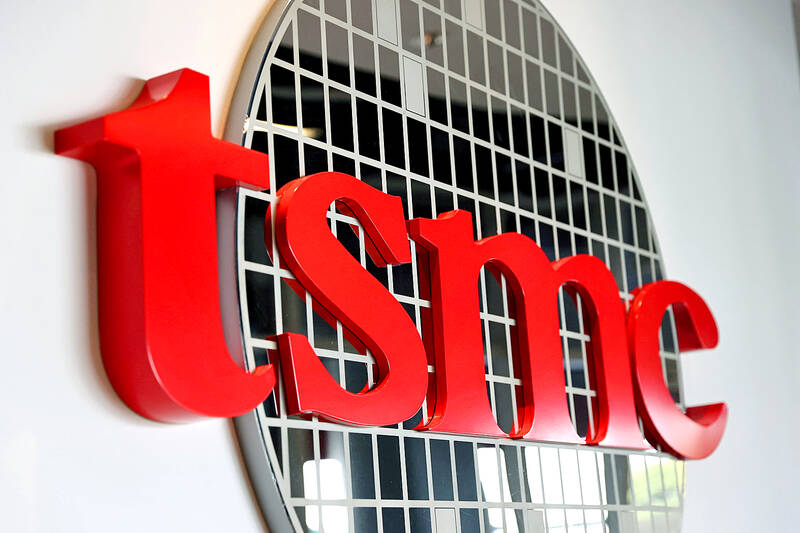Taiwan Semiconductor Manufacturing Co (TSMC, 台積電) accounted for 30 percent of the sales in the global IC industry last year, it said on Friday.
The figure excludes memory chips, the world’s largest contract chipmaker said in a report to shareholders ahead of its annual general meeting on June 6.
It was the first time that the company’s revenue made up 30 percent of the global total and represents a 4 percent annual increase, TSMC said.

Photo: Reuters
The company said it generated NT$2.26 trillion (US$73.76 billion) in consolidated sales last year, up 42.6 percent from a year earlier and the 13th consecutive annual increase.
“The year 2022 was a landmark year for TSMC,” the chipmaker said. “Supported by our strong technology leadership and differentiation, we delivered the 13th consecutive year of record revenue, with strong profitable growth.”
TSMC at the end of last year began the commercial production of chips made using its advanced 3-nanometer process. The company at the time said it expects the chips to contribute significantly to its revenue in the third quarter.
Advanced technologies, meaning 7 nanometers and below, made up 53 percent of TSMC’s total wafer revenue last year, up from 50 percent in 2021.
Net profit last year totaled NT$1.01 trillion, up 70.4 percent from a year earlier, on the back of robust global demand for emerging technologies, such as automotive electronics, 5G applications and high-performance computing devices, the company said.
Earnings per share nearly tripled over the past three years to reach NT$39.2 last year, TSMC said.
The company said it shipped about 15.30 million 12-inch equivalent wafers last year, up 1.1 million units from a year earlier.
The increase came after the company deployed 288 distinct process technologies and rolled out 12,698 products for 532 customers.
The chipmaker is developing the more sophisticated 2-nanometer process, which is expected to enter commercial production in 2025, with a trial run scheduled for next year.
TSMC said the process would be the most advanced semiconductor technology in the global IC industry in density and energy efficiency.
However, TSMC was not spared from ongoing inventory adjustments in the global semiconductor industry amid weakening demand from end users.
Last month, TSMC told investors that sales this year would fall 1 to 6 percent from last year in US dollar terms, a downgrade from its January estimate of a “slight increase.”
The chipmaker has kept its capital expenditure budget within a range of US$32 billion to US$36 billion for this year, even though sales in the first quarter fell 18.7 percent from the previous quarter to NT$508.63 billion, and net profit dropped 30 percent to NT$206.99 billion.

‘CORRECT IDENTIFICATION’: Beginning in May, Taiwanese married to Japanese can register their home country as Taiwan in their spouse’s family record, ‘Nikkei Asia’ said The government yesterday thanked Japan for revising rules that would allow Taiwanese nationals married to Japanese citizens to list their home country as “Taiwan” in the official family record database. At present, Taiwanese have to select “China.” Minister of Foreign Affairs Lin Chia-lung (林佳龍) said the new rule, set to be implemented in May, would now “correctly” identify Taiwanese in Japan and help protect their rights, the Ministry of Foreign Affairs said in a statement. The statement was released after Nikkei Asia reported the new policy earlier yesterday. The name and nationality of a non-Japanese person marrying a Japanese national is added to the

AT RISK: The council reiterated that people should seriously consider the necessity of visiting China, after Beijing passed 22 guidelines to punish ‘die-hard’ separatists The Mainland Affairs Council (MAC) has since Jan. 1 last year received 65 petitions regarding Taiwanese who were interrogated or detained in China, MAC Minister Chiu Chui-cheng (邱垂正) said yesterday. Fifty-two either went missing or had their personal freedoms restricted, with some put in criminal detention, while 13 were interrogated and temporarily detained, he said in a radio interview. On June 21 last year, China announced 22 guidelines to punish “die-hard Taiwanese independence separatists,” allowing Chinese courts to try people in absentia. The guidelines are uncivilized and inhumane, allowing Beijing to seize assets and issue the death penalty, with no regard for potential

‘UNITED FRONT’ FRONTS: Barring contact with Huaqiao and Jinan universities is needed to stop China targeting Taiwanese students, the education minister said Taiwan has blacklisted two Chinese universities from conducting academic exchange programs in the nation after reports that the institutes are arms of Beijing’s United Front Work Department, Minister of Education Cheng Ying-yao (鄭英耀) said in an exclusive interview with the Chinese-language Liberty Times (the Taipei Times’ sister paper) published yesterday. China’s Huaqiao University in Xiamen and Quanzhou, as well as Jinan University in Guangzhou, which have 600 and 1,500 Taiwanese on their rolls respectively, are under direct control of the Chinese government’s political warfare branch, Cheng said, citing reports by national security officials. A comprehensive ban on Taiwanese institutions collaborating or

STILL COMMITTED: The US opposes any forced change to the ‘status quo’ in the Strait, but also does not seek conflict, US Secretary of State Marco Rubio said US President Donald Trump’s administration released US$5.3 billion in previously frozen foreign aid, including US$870 million in security exemptions for programs in Taiwan, a list of exemptions reviewed by Reuters showed. Trump ordered a 90-day pause on foreign aid shortly after taking office on Jan. 20, halting funding for everything from programs that fight starvation and deadly diseases to providing shelters for millions of displaced people across the globe. US Secretary of State Marco Rubio, who has said that all foreign assistance must align with Trump’s “America First” priorities, issued waivers late last month on military aid to Israel and Egypt, the